11 Moments When the Universe Is Speaking to You
Some events are so uncanny, they force us to question whether life is random or something magical is at play. Other marvels are quieter but still have the power to transform our lives.
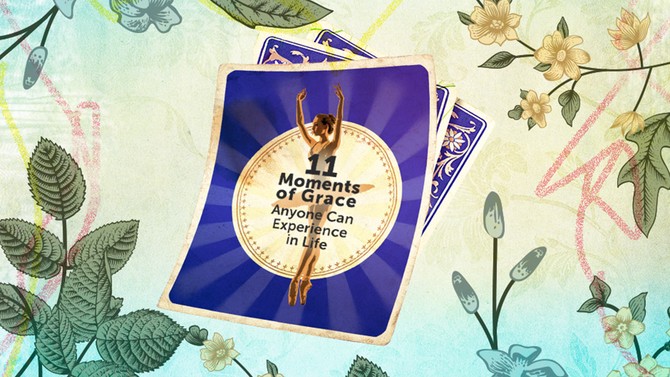
Illustration: OWN Digital
Say you hear about a job you're not interested in—but your friend insists you interview. "Trust me," she says. Which is how you end up talking to a woman who is bright, funny, bracing. You feel a shift: "I want this job," you think. "I belong here." There follows a gradual unfolding: the boss who becomes a mentor, the coworkers who become friends, the work you didn't know you'd love. Only years later do you see how far one person's benevolent influence rippled, growing from small rings to the rolling waves still beyond your sight.
Life sends us serendipities; it drops little miracles into our laps. You hear your college sweetheart's favorite song, turn the corner and run into him. You lock your keys in your car at the gas station and see your roommate at the next pump. That's grace, but there is another kind, too—a subtler kind that heralds the beginning of something, or simply brings unexpected delight. That bad restaurant? The guy in line for the bathroom will turn out to be the man you marry. That vending machine? It's going to give you an extra Kit Kat.
Who offers these gifts? God, the universe, dumb luck, a metaphysical entity that occasionally rigs a vending machine? Whatever the answer, one thing is certain: The world is marvelously mysterious. Grace shows up now and again to remind us of this.
It is a blessing that can't be earned, only received. You'd get nothing done if you went around watching for miracles all the time. But you'd do well to stay alert enough to see them out of the corner of your eye.
—Michelle Wildgen
Life sends us serendipities; it drops little miracles into our laps. You hear your college sweetheart's favorite song, turn the corner and run into him. You lock your keys in your car at the gas station and see your roommate at the next pump. That's grace, but there is another kind, too—a subtler kind that heralds the beginning of something, or simply brings unexpected delight. That bad restaurant? The guy in line for the bathroom will turn out to be the man you marry. That vending machine? It's going to give you an extra Kit Kat.
Who offers these gifts? God, the universe, dumb luck, a metaphysical entity that occasionally rigs a vending machine? Whatever the answer, one thing is certain: The world is marvelously mysterious. Grace shows up now and again to remind us of this.
It is a blessing that can't be earned, only received. You'd get nothing done if you went around watching for miracles all the time. But you'd do well to stay alert enough to see them out of the corner of your eye.
—Michelle Wildgen
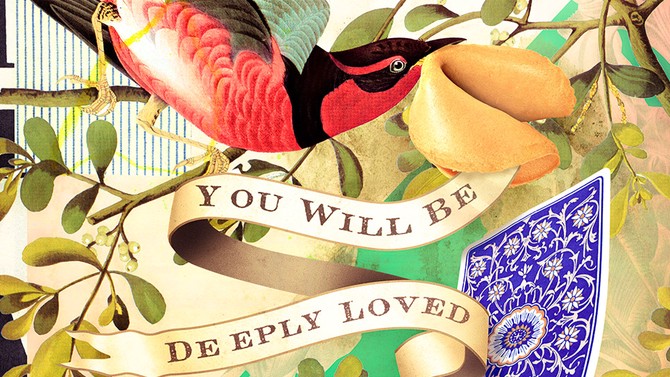
Illustration: Eduardo Recife
Just when she'd lost faith in herself, fortune smiled upon Heather Havrilesky.
I was 34, living in my rundown house, fresh off a breakup. It felt good to be alone, painting walls and planting flowers—but me being me, that meant there were paint cans scattered in the living room and giant bags of garden soil lining the front porch. I felt like an adult with training wheels attached. I needed to get my act together before I fell in love again, lest I attract one more flailing man-child.
I had barely made any strides toward actual adulthood when a guy who read my blog emailed me. He sounded smart and charming. We traded messages, then photos; he sent me one of himself surfing. "A handsome professor who surfs," I thought. This didn't excite so much as intimidate me. He was a real grown-up. And yet, when he asked for my number, I gave it to him.
The next day, my cell phone rang, but I couldn't find it in my purse—I fumbled through a mass of old receipts, stray pennies and decomposing breath mints, picturing the handsome surfer-professor sitting in some sophisticated chair in some pristine apartment, waiting for me to pick up. "He could never love someone as disorganized and messy and immature as I am," I thought. And just as I was thinking this, I pulled an old cookie fortune out of my handbag's filth. It said "You will be deeply loved."
The phone went silent, but I didn't care. I was staring at the fortune. It felt like a sign—not that I would win over this man, necessarily, but that one day I would be loved in all my messy immaturity. That I could be loved.
And the fortune was right. The surfer turned out to be a regular guy with regular insecurities and flaws. We've been married for eight years, and we have two little girls.
The fortune isn't what brought us together. It didn't seal our fate or convince the cosmos to gift me with a handsome professor. The fortune taught me that if I chose to see myself as worthy of being loved, I would be loved. Deeply. Half-painted rooms and all.
I was 34, living in my rundown house, fresh off a breakup. It felt good to be alone, painting walls and planting flowers—but me being me, that meant there were paint cans scattered in the living room and giant bags of garden soil lining the front porch. I felt like an adult with training wheels attached. I needed to get my act together before I fell in love again, lest I attract one more flailing man-child.
I had barely made any strides toward actual adulthood when a guy who read my blog emailed me. He sounded smart and charming. We traded messages, then photos; he sent me one of himself surfing. "A handsome professor who surfs," I thought. This didn't excite so much as intimidate me. He was a real grown-up. And yet, when he asked for my number, I gave it to him.
The next day, my cell phone rang, but I couldn't find it in my purse—I fumbled through a mass of old receipts, stray pennies and decomposing breath mints, picturing the handsome surfer-professor sitting in some sophisticated chair in some pristine apartment, waiting for me to pick up. "He could never love someone as disorganized and messy and immature as I am," I thought. And just as I was thinking this, I pulled an old cookie fortune out of my handbag's filth. It said "You will be deeply loved."
The phone went silent, but I didn't care. I was staring at the fortune. It felt like a sign—not that I would win over this man, necessarily, but that one day I would be loved in all my messy immaturity. That I could be loved.
And the fortune was right. The surfer turned out to be a regular guy with regular insecurities and flaws. We've been married for eight years, and we have two little girls.
The fortune isn't what brought us together. It didn't seal our fate or convince the cosmos to gift me with a handsome professor. The fortune taught me that if I chose to see myself as worthy of being loved, I would be loved. Deeply. Half-painted rooms and all.

Illustration: OWN Digital
Sarah Meyer discovers a wrinkle in time.
When my father told me last Christmas that he wanted to buy me a watch, I imagined us choosing a lovely vintage piece like the ones he'd always prized; I spent countless hours of my childhood browsing alongside him at ramshackle antiques shops. But to find the watch, he drove us, of all places, to a department store. "Any one you want!" he said. I fixed my gaze on the counter to hide my disappointment. My father said happily, "Aren't these nice?" To me, nothing was nice. Everything was too shiny, too pristine, with no story or spirit. I made three trips around the case, until finally, one caught my eye: oxblood faux-alligator band, slim gold face. The watch was new, but something about it had the flavor of my father. I pointed it out to him and his pleasant expression faded. Tears welled in his eyes. "That one?" he asked. "You're sure?" Confused, I nodded, and he called the salesgirl over to box it up. Back home, he led me into his study. He pulled an envelope from his desk and emptied its contents into my hand. It was a watch with an inscription on the back: NM TO EM 12-24-36. My father said, "It was your grandfather's." My grandmother had given it to him for Christmas almost 80 years earlier. It was a near-perfect double of the one I'd chosen that day.
When my father told me last Christmas that he wanted to buy me a watch, I imagined us choosing a lovely vintage piece like the ones he'd always prized; I spent countless hours of my childhood browsing alongside him at ramshackle antiques shops. But to find the watch, he drove us, of all places, to a department store. "Any one you want!" he said. I fixed my gaze on the counter to hide my disappointment. My father said happily, "Aren't these nice?" To me, nothing was nice. Everything was too shiny, too pristine, with no story or spirit. I made three trips around the case, until finally, one caught my eye: oxblood faux-alligator band, slim gold face. The watch was new, but something about it had the flavor of my father. I pointed it out to him and his pleasant expression faded. Tears welled in his eyes. "That one?" he asked. "You're sure?" Confused, I nodded, and he called the salesgirl over to box it up. Back home, he led me into his study. He pulled an envelope from his desk and emptied its contents into my hand. It was a watch with an inscription on the back: NM TO EM 12-24-36. My father said, "It was your grandfather's." My grandmother had given it to him for Christmas almost 80 years earlier. It was a near-perfect double of the one I'd chosen that day.
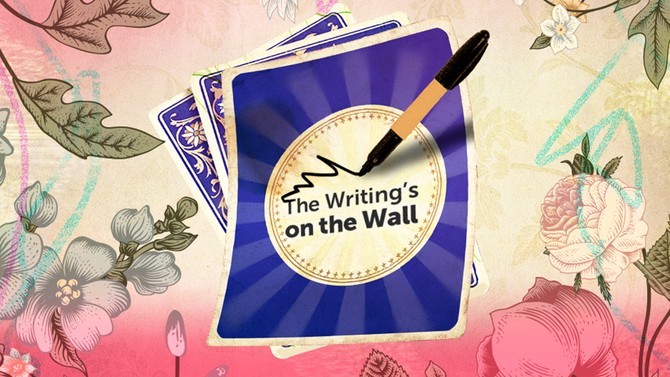
Illustration: OWN Digital
Justine Blau's poetic encounter with her mother's memory.
I was waiting to be seated at Manhattan's Cafe Lalo two years ago when I noticed, inscribed on a tile wall, a poem titled "To Be Alive." It was dated 1976, and signed by my mother.
As a child I'd lived in fear of her uninvited appearances. She was a restless, troubled soul, a volatile force in my life at the best of times. As kids, my brothers and I moved in and out of hotels, occasionally spending nights in 24-hour coffee shops or on the subway. Once, my mother and I slept in the ladies' room of a funeral parlor. When I was 11, a court took me away from my mother, but she disobeyed visiting rules, showing up unannounced at the group homes where I was placed, demanding to see me. After she kidnapped me from one of them, she was arrested and briefly placed in a mental hospital. For decades she wandered New York City, bartering poetry for coffee and slices of cake.
And here she was, almost ten years after her death, arriving unannounced once again.
I spoke to the café manager and was stunned when she told me her fourth-grade daughter had memorized the poem for a class assignment. I called the owner, who said he had never met my mother and wasn't sure how her work had made its way to the restaurant. He told me his name was Haim, the Hebrew word for "life." It's also my grandfather's and my son's. Life—its wonder, its beauty—was something my mother cherished. Her poem begins, "It's good to be alive / To laugh and love and thrive." On my way out, I noticed that "To Be Alive" is printed on the café's takeout menu. I searched for the poem online and found that it also lives on many inspirational blogs and cancer-support websites.
My mother often left me shaken and afraid. But discovering that to some she is a source of wisdom reminded me of the gift she had given me: a passion for life. And it's good to be alive, to laugh and love and thrive.
I was waiting to be seated at Manhattan's Cafe Lalo two years ago when I noticed, inscribed on a tile wall, a poem titled "To Be Alive." It was dated 1976, and signed by my mother.
As a child I'd lived in fear of her uninvited appearances. She was a restless, troubled soul, a volatile force in my life at the best of times. As kids, my brothers and I moved in and out of hotels, occasionally spending nights in 24-hour coffee shops or on the subway. Once, my mother and I slept in the ladies' room of a funeral parlor. When I was 11, a court took me away from my mother, but she disobeyed visiting rules, showing up unannounced at the group homes where I was placed, demanding to see me. After she kidnapped me from one of them, she was arrested and briefly placed in a mental hospital. For decades she wandered New York City, bartering poetry for coffee and slices of cake.
And here she was, almost ten years after her death, arriving unannounced once again.
I spoke to the café manager and was stunned when she told me her fourth-grade daughter had memorized the poem for a class assignment. I called the owner, who said he had never met my mother and wasn't sure how her work had made its way to the restaurant. He told me his name was Haim, the Hebrew word for "life." It's also my grandfather's and my son's. Life—its wonder, its beauty—was something my mother cherished. Her poem begins, "It's good to be alive / To laugh and love and thrive." On my way out, I noticed that "To Be Alive" is printed on the café's takeout menu. I searched for the poem online and found that it also lives on many inspirational blogs and cancer-support websites.
My mother often left me shaken and afraid. But discovering that to some she is a source of wisdom reminded me of the gift she had given me: a passion for life. And it's good to be alive, to laugh and love and thrive.
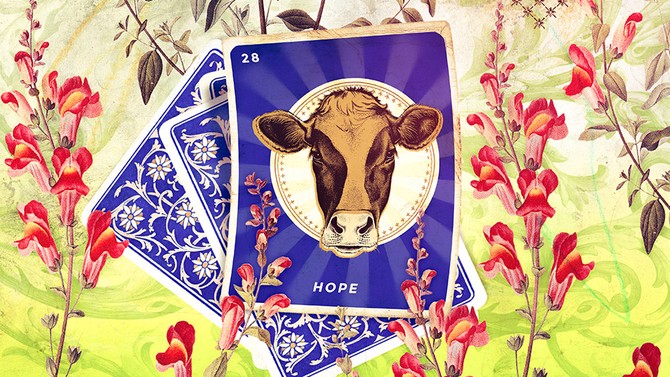
Illustration: Eduardo Recife
Battered by loss, with nowhere to go, Will Boast found his future in a novel, a phone call—and a guide on four hooves.
Seven years ago, I was stranded—grief-stricken, a year out of grad school, living alone in a rented house in Virginia. My dad had passed away, and I'd sold our family home in Wisconsin. The last anchor to my past was gone; the future spread before me like an ocean, blank and formless. I made lists of places I might go, wrote out pros and cons. But there seemed no point in going anywhere at all.
I filled my time with books. One night I sat down to finish Graham Greene's The End of the Affair, the story of a love triangle: Henry, a London civil servant, is married to Sarah, who takes as her lover Bendrix, a young writer. The novel, set in the darkest days of World War II, is also a story of faith. When Bendrix's flat is hit by a bomb, Sarah asks God to let him live. Moments later, Bendrix emerges from the debris; in the end, it's Sarah who dies. Henry and Bendrix, former rivals, are united by loss. Henry invites Bendrix to move in with him, and the bereaved men make a home together. Upon finishing Greene's book, I was unaccountably comforted. That night I slept better than I had in weeks.
The next morning, I was awakened by a call from a childhood friend. He'd just broken up with his girlfriend of six years. He wanted me to come to Madison and move in with him, help him make rent. Maybe he needed me to see him through the breakup. I knew I needed him to help me come back to life.
He flew down to Virginia so we could take shifts driving the moving van to Wisconsin. I packed my things, still slightly bewildered at how it had all come to pass.
On the morning we pulled out of town, I was driving through my residential neighborhood when I saw a figure emerge from the mist: a massive black and white creature on four hooves. It was a Holstein cow, the very emblem of the Dairy State. It passed within feet of us, then disappeared into a backyard. There were no farms for miles.
"I'll never lose my faith in coincidence," Bendrix says in Greene's novel.
There are rare moments when life, often so arbitrary, sends you a note of encouragement. "You can put your faith in friends," it said that day. "You can find your way."
I like to think we followed that cow all the way back home.
Seven years ago, I was stranded—grief-stricken, a year out of grad school, living alone in a rented house in Virginia. My dad had passed away, and I'd sold our family home in Wisconsin. The last anchor to my past was gone; the future spread before me like an ocean, blank and formless. I made lists of places I might go, wrote out pros and cons. But there seemed no point in going anywhere at all.
I filled my time with books. One night I sat down to finish Graham Greene's The End of the Affair, the story of a love triangle: Henry, a London civil servant, is married to Sarah, who takes as her lover Bendrix, a young writer. The novel, set in the darkest days of World War II, is also a story of faith. When Bendrix's flat is hit by a bomb, Sarah asks God to let him live. Moments later, Bendrix emerges from the debris; in the end, it's Sarah who dies. Henry and Bendrix, former rivals, are united by loss. Henry invites Bendrix to move in with him, and the bereaved men make a home together. Upon finishing Greene's book, I was unaccountably comforted. That night I slept better than I had in weeks.
The next morning, I was awakened by a call from a childhood friend. He'd just broken up with his girlfriend of six years. He wanted me to come to Madison and move in with him, help him make rent. Maybe he needed me to see him through the breakup. I knew I needed him to help me come back to life.
He flew down to Virginia so we could take shifts driving the moving van to Wisconsin. I packed my things, still slightly bewildered at how it had all come to pass.
On the morning we pulled out of town, I was driving through my residential neighborhood when I saw a figure emerge from the mist: a massive black and white creature on four hooves. It was a Holstein cow, the very emblem of the Dairy State. It passed within feet of us, then disappeared into a backyard. There were no farms for miles.
"I'll never lose my faith in coincidence," Bendrix says in Greene's novel.
There are rare moments when life, often so arbitrary, sends you a note of encouragement. "You can put your faith in friends," it said that day. "You can find your way."
I like to think we followed that cow all the way back home.
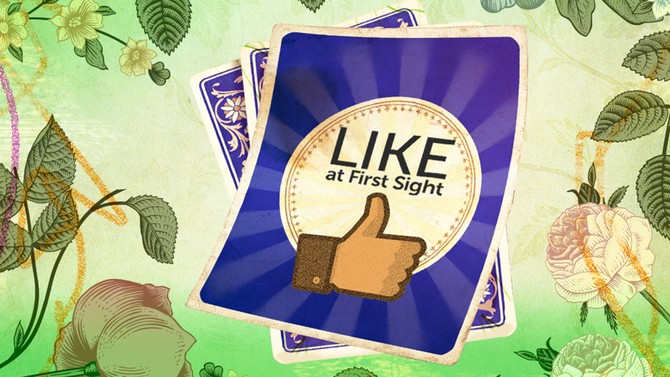
Illustration: OWN Digital
Jane Bernstein and Heather Sellers on the magic moment that made them friends.
Bernstein: A mutual friend said, "Oh, you really need to meet this writer, Heather Sellers. She teaches in the Midwest, just like you do, she rides a bike, like you do, and she sublets in New York each summer, just like you." I said sure, thank you. In truth, I had a lot of friends and didn't have time for another. I didn't really want to meet you.
Sellers: And I thought, "Why can't I be introduced to a nice man?" But I said yes, reluctantly. And then your email was so sweet: "We've been fixed up! I'll go anywhere." I suggested meeting in Central Park for a short walk, 5 P.M., in and out. You were late.... Part of me hoped you wouldn't show.
Bernstein: That first moment of meeting...what do you remember, other than that I was wearing those awful brown pants?
Sellers: Smart. Pretty. Curious. But the most important thing for me was this very intent way you asked questions. I'd never experienced anything like it, honestly. You wanted to know me in this completely singular way. We just fell into a deep, connected conversation. It was thrilling.
Bernstein: It was easy, because you're so receptive and open, really able to connect on an emotional level—and you're supersmart and uncynical. People become so guarded. My own reserve fell away; your liveliness brought me to life.
Sellers: We were walking around the Reservoir when I realized I had to have this friendship.
Bernstein: It was the same for me. Two hours had flown by; it was dusk. We had to part. But I knew I had to see you again. Like with romantic love, the obstacles no longer mattered—that we lived 1,000 miles from each other, our busy lives. I said, "Hey, my daughter's having a party Friday. Will you come?"
Sellers: One date and you wanted to take me home to meet your family.
Bernstein: I know. And it's been so great, hasn't it?
Sellers: It's been one long conversation, unbroken—this deep, rich river of words for three years now. All from that one moment in Central Park.
Bernstein: One of us in bad pants.
Editors' note: Both Bernstein and Sellers contacted us independently, wanting to write their story, unaware that the other had reached out to the magazine. Moment of grace double whammy!
Bernstein: A mutual friend said, "Oh, you really need to meet this writer, Heather Sellers. She teaches in the Midwest, just like you do, she rides a bike, like you do, and she sublets in New York each summer, just like you." I said sure, thank you. In truth, I had a lot of friends and didn't have time for another. I didn't really want to meet you.
Sellers: And I thought, "Why can't I be introduced to a nice man?" But I said yes, reluctantly. And then your email was so sweet: "We've been fixed up! I'll go anywhere." I suggested meeting in Central Park for a short walk, 5 P.M., in and out. You were late.... Part of me hoped you wouldn't show.
Bernstein: That first moment of meeting...what do you remember, other than that I was wearing those awful brown pants?
Sellers: Smart. Pretty. Curious. But the most important thing for me was this very intent way you asked questions. I'd never experienced anything like it, honestly. You wanted to know me in this completely singular way. We just fell into a deep, connected conversation. It was thrilling.
Bernstein: It was easy, because you're so receptive and open, really able to connect on an emotional level—and you're supersmart and uncynical. People become so guarded. My own reserve fell away; your liveliness brought me to life.
Sellers: We were walking around the Reservoir when I realized I had to have this friendship.
Bernstein: It was the same for me. Two hours had flown by; it was dusk. We had to part. But I knew I had to see you again. Like with romantic love, the obstacles no longer mattered—that we lived 1,000 miles from each other, our busy lives. I said, "Hey, my daughter's having a party Friday. Will you come?"
Sellers: One date and you wanted to take me home to meet your family.
Bernstein: I know. And it's been so great, hasn't it?
Sellers: It's been one long conversation, unbroken—this deep, rich river of words for three years now. All from that one moment in Central Park.
Bernstein: One of us in bad pants.
Editors' note: Both Bernstein and Sellers contacted us independently, wanting to write their story, unaware that the other had reached out to the magazine. Moment of grace double whammy!
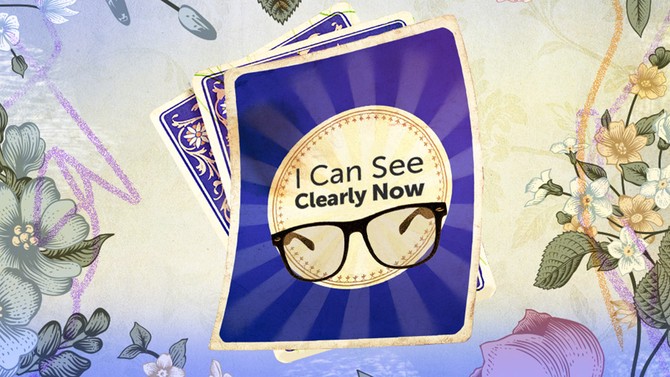
Illustration: OWN Digital
Carin Clevidence leaves her pain on a distant shore.
I'm with my sister, Shelly, on the rocky peak of a remote island in the Falklands. Below us, black-browed albatrosses wheel toward their nests. My sister breathes in and cries, "I love the smell of guano in the morning!" Then she laughs, big and loud, full of joy.
Once, in a movie theater, my husband shushed me for laughing that loudly. Six thousand miles away, in Massachusetts, he has just moved out. For months since his blindsiding betrayal I've felt lost, trapped with a cold stranger. The pain is like a dark, locked room.
Now Shelly, my 10-year-old daughter, and I have joined my mother and stepfather on the ship where they work. No one on board has ever been to this island before. Few people have.
My sister's laugh peals out. She throws an arm around my waist, and something in me swings open. The world rushes in. I feel the sun blazing on my face, hear waves crashing on the rocks. Below us my mother and daughter search the tussock grass for Magellanic penguins. The blue sea unfolds before us in every direction.
I know the sadness that waits for me at home. But right now I'm here, in a wondrous, unexpected place. I want to inhabit this moment as fully as my sister inhabits her laugh. That familiar sound, one I've heard all my life, pulls me back to who I am.
I'm with my sister, Shelly, on the rocky peak of a remote island in the Falklands. Below us, black-browed albatrosses wheel toward their nests. My sister breathes in and cries, "I love the smell of guano in the morning!" Then she laughs, big and loud, full of joy.
Once, in a movie theater, my husband shushed me for laughing that loudly. Six thousand miles away, in Massachusetts, he has just moved out. For months since his blindsiding betrayal I've felt lost, trapped with a cold stranger. The pain is like a dark, locked room.
Now Shelly, my 10-year-old daughter, and I have joined my mother and stepfather on the ship where they work. No one on board has ever been to this island before. Few people have.
My sister's laugh peals out. She throws an arm around my waist, and something in me swings open. The world rushes in. I feel the sun blazing on my face, hear waves crashing on the rocks. Below us my mother and daughter search the tussock grass for Magellanic penguins. The blue sea unfolds before us in every direction.
I know the sadness that waits for me at home. But right now I'm here, in a wondrous, unexpected place. I want to inhabit this moment as fully as my sister inhabits her laugh. That familiar sound, one I've heard all my life, pulls me back to who I am.
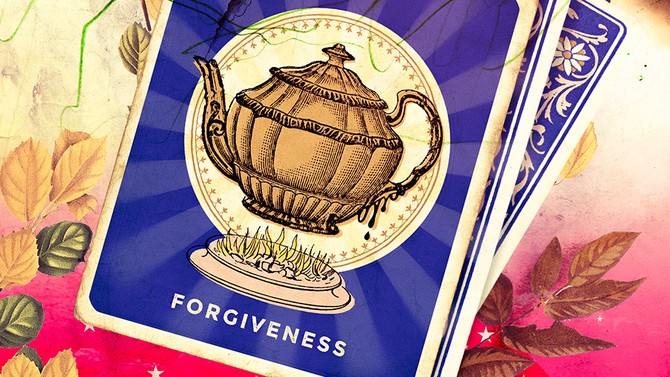
Illustration: Eduardo Recife
"You live, you learn, you burn a few pots. Is that so bad? asks Victoria Redel.
How many saucepans and teapots have I forgotten on the stove over the years? How many burnt kettles have I returned to, finding their plastic handles melted, nightmarishly deformed? I've bought trilling kettles, chirping kettles, kettles that screech. And yet, lost in work or email, I forget about that cup of tea I wanted until an acrid smell returns me to the kitchen. I've instituted systems of punishment: Once, I told myself I wasn't allowed to buy a replacement kettle, then got desperate enough to use a soup pot to heat up water for tea. I let that burn, too.
This weekend I put beets on to boil. I checked once, twice, and then, knowing that beets take a good long time, set out to finish other chores. I folded laundry, which led to cleaning out a chest of drawers, which led to rearranging cluttered closet shelves, and when the phone rang, it was an old friend, and soon my son ran in to tell me that the kitchen was smoky. "Your pot burned again," he said. "Come on, Mom, are you really this hopeless?"
Oh, the sight of those pitiful beets, blackened and stuck to the bottom of that scorched vessel! Oh, the awful sting of shame! Why couldn't I see one thing through? Shouldn't I live in a clear, directed way, honoring each task by allowing it to have its moment?
And yet. Standing at the sink, looking at the burnt layers that flaked off each orb to reveal perfectly cooked red and yellow beets, I was hit with a sudden epiphany: I had committed no crime. Single-minded focus might be a beautiful goal, but sometimes life is so full of things to see and do and look after, and isn't that lucky? Shouldn't that abundance also be embraced? It was such a forgiving notion, a rare moment when I took a break from feeling guilty long enough to see the uselessness of my guilt.
I crumbled goat cheese over the beets, thinking about how a full life insists on chaos, which might occasionally involve a wrecked pot. If, indeed, I was hopeless, I was at least hopefully hopeless: Pots can be cleaned. Life will go on, full of delicious distractions. And there will occasionally come moments that remind you all is well.
How many saucepans and teapots have I forgotten on the stove over the years? How many burnt kettles have I returned to, finding their plastic handles melted, nightmarishly deformed? I've bought trilling kettles, chirping kettles, kettles that screech. And yet, lost in work or email, I forget about that cup of tea I wanted until an acrid smell returns me to the kitchen. I've instituted systems of punishment: Once, I told myself I wasn't allowed to buy a replacement kettle, then got desperate enough to use a soup pot to heat up water for tea. I let that burn, too.
This weekend I put beets on to boil. I checked once, twice, and then, knowing that beets take a good long time, set out to finish other chores. I folded laundry, which led to cleaning out a chest of drawers, which led to rearranging cluttered closet shelves, and when the phone rang, it was an old friend, and soon my son ran in to tell me that the kitchen was smoky. "Your pot burned again," he said. "Come on, Mom, are you really this hopeless?"
Oh, the sight of those pitiful beets, blackened and stuck to the bottom of that scorched vessel! Oh, the awful sting of shame! Why couldn't I see one thing through? Shouldn't I live in a clear, directed way, honoring each task by allowing it to have its moment?
And yet. Standing at the sink, looking at the burnt layers that flaked off each orb to reveal perfectly cooked red and yellow beets, I was hit with a sudden epiphany: I had committed no crime. Single-minded focus might be a beautiful goal, but sometimes life is so full of things to see and do and look after, and isn't that lucky? Shouldn't that abundance also be embraced? It was such a forgiving notion, a rare moment when I took a break from feeling guilty long enough to see the uselessness of my guilt.
I crumbled goat cheese over the beets, thinking about how a full life insists on chaos, which might occasionally involve a wrecked pot. If, indeed, I was hopeless, I was at least hopefully hopeless: Pots can be cleaned. Life will go on, full of delicious distractions. And there will occasionally come moments that remind you all is well.

Illustration: OWN Digital
In the throes of grief, Lashon Daley finds solace in an act of kindness.
Wedding dress shopping was near the top of the list my mother and I made of things we had to do together—things we would do while we could. We had drafted it only partially believing that time was running out. Six months, the oncologist had told her.
I wasn't engaged, didn't have a boyfriend. But I wanted the experience I'd seen on television: stepping into a white gown and seeing in my mother's face that it was the perfect one, the one. I knew it was her dream, too, and I wanted it to come true.
She was weak the morning we went to the shop. She needed help navigating the narrow aisles of white, cream and bone-colored gowns. I left the dressing room swaddled in ivory tulle, but felt light as dandelion fluff. The dress had a sweeping train, a fitted bodice. I felt like a bride. "Mommy, this is the dress," I said. I wanted to run to her like a little girl—like children do when the only person who can comfort them is their mother.
But I didn't have to go to her. With help, she lifted herself from her chair and came over to stand beside me. The saleswoman took photos as my mother nestled close, smiling and playing with my long veil. Two months later, she was gone.
After the funeral, I received a condolence card from my church, whose members had exclaimed over our bridal pictures. Inside was an origami wedding dress made out of a page from Romeo and Juliet. Tucked behind it was a check for a deposit on the dress, a sum pooled by the congregation. "You deserve to have that dress," the pastor's wife had written. I couldn't afford to buy it right then, and anyway, I still had no fiancé. But I called the bridal shop and asked for the dress to be set aside. I put the money into a special savings account and began adding to it, little by little. I go back to check on the dress now and again, looking forward to the day when I'll return to claim it—and to the day I'll wear what my mother helped to choose, her presence and love sewn into every seam.
Wedding dress shopping was near the top of the list my mother and I made of things we had to do together—things we would do while we could. We had drafted it only partially believing that time was running out. Six months, the oncologist had told her.
I wasn't engaged, didn't have a boyfriend. But I wanted the experience I'd seen on television: stepping into a white gown and seeing in my mother's face that it was the perfect one, the one. I knew it was her dream, too, and I wanted it to come true.
She was weak the morning we went to the shop. She needed help navigating the narrow aisles of white, cream and bone-colored gowns. I left the dressing room swaddled in ivory tulle, but felt light as dandelion fluff. The dress had a sweeping train, a fitted bodice. I felt like a bride. "Mommy, this is the dress," I said. I wanted to run to her like a little girl—like children do when the only person who can comfort them is their mother.
But I didn't have to go to her. With help, she lifted herself from her chair and came over to stand beside me. The saleswoman took photos as my mother nestled close, smiling and playing with my long veil. Two months later, she was gone.
After the funeral, I received a condolence card from my church, whose members had exclaimed over our bridal pictures. Inside was an origami wedding dress made out of a page from Romeo and Juliet. Tucked behind it was a check for a deposit on the dress, a sum pooled by the congregation. "You deserve to have that dress," the pastor's wife had written. I couldn't afford to buy it right then, and anyway, I still had no fiancé. But I called the bridal shop and asked for the dress to be set aside. I put the money into a special savings account and began adding to it, little by little. I go back to check on the dress now and again, looking forward to the day when I'll return to claim it—and to the day I'll wear what my mother helped to choose, her presence and love sewn into every seam.
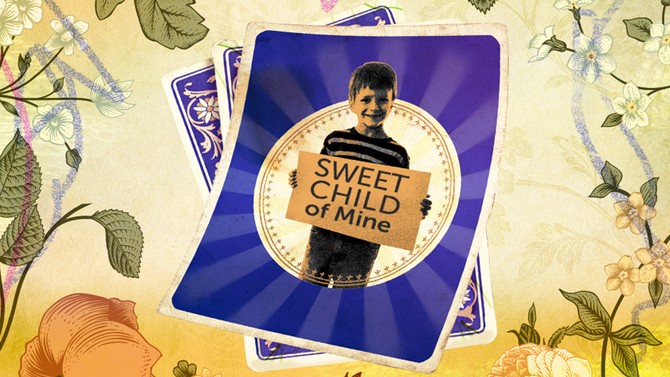
Illustration: OWN Digital
C.J. Evans on the long, hard road to connection.
For the first four months of my son's life, he never, not once, slept longer than two hours at a stretch. His crying was a shrill wail we could not quiet. My wife and I tried everything: medication for acid reflux, pacing the hallway, rasping "shh, shh, shh" until we went hoarse. Once we had to go back to work, we split shifts. I'd watch him scream until 2 a.m., then take him into our bedroom, where my wife would lie with him until 6. I would sleep a few hours on the too-short sofa, then get our 2-year-old daughter ready for preschool.
There were no happy times with him, no cuddling or playing. For fathers, who don't have the intimacy of pregnancy or breastfeeding, parenthood is something that deepens with time and interaction. But all he did was scream at me. Sometimes I screamed back. I'd walk away from the useless swing, shut off the music that wasn't soothing him, and bury my face in my hands. I felt nothing but doubt and worry and emergency.
One morning, as usual, I stared blankly into his shrieking face as I put him in his swing, said goodbye to the nanny and got on the bus to go to work. Ten minutes later, my wife called, frantic. The nanny had heard him crying, the sound muffled. She found him facedown, and when she picked him up, his lips were blue. I had forgotten to buckle him in. He had turned over in the swing, his face pressing against the padded seat. My wife was racing home to take him to the hospital. I shoved my way off the bus and sprinted the 15 blocks to our house.
I can still feel the adrenaline in my hands and feet during that run, the flush in my face. As the world narrowed to a pinpoint, as everything besides getting home to my son ceased to matter, I felt the connection that had grown without my even realizing it. This moment of terror showed me that I had become his father.
He's a year and a half old now, healthy and happy. Another few seconds, the doctor said that day, and he would have had brain damage. Or worse. We were lucky—so lucky. I had almost lost him. Not just a baby. Not just my responsibility. But Auden, whom I loved.
For the first four months of my son's life, he never, not once, slept longer than two hours at a stretch. His crying was a shrill wail we could not quiet. My wife and I tried everything: medication for acid reflux, pacing the hallway, rasping "shh, shh, shh" until we went hoarse. Once we had to go back to work, we split shifts. I'd watch him scream until 2 a.m., then take him into our bedroom, where my wife would lie with him until 6. I would sleep a few hours on the too-short sofa, then get our 2-year-old daughter ready for preschool.
There were no happy times with him, no cuddling or playing. For fathers, who don't have the intimacy of pregnancy or breastfeeding, parenthood is something that deepens with time and interaction. But all he did was scream at me. Sometimes I screamed back. I'd walk away from the useless swing, shut off the music that wasn't soothing him, and bury my face in my hands. I felt nothing but doubt and worry and emergency.
One morning, as usual, I stared blankly into his shrieking face as I put him in his swing, said goodbye to the nanny and got on the bus to go to work. Ten minutes later, my wife called, frantic. The nanny had heard him crying, the sound muffled. She found him facedown, and when she picked him up, his lips were blue. I had forgotten to buckle him in. He had turned over in the swing, his face pressing against the padded seat. My wife was racing home to take him to the hospital. I shoved my way off the bus and sprinted the 15 blocks to our house.
I can still feel the adrenaline in my hands and feet during that run, the flush in my face. As the world narrowed to a pinpoint, as everything besides getting home to my son ceased to matter, I felt the connection that had grown without my even realizing it. This moment of terror showed me that I had become his father.
He's a year and a half old now, healthy and happy. Another few seconds, the doctor said that day, and he would have had brain damage. Or worse. We were lucky—so lucky. I had almost lost him. Not just a baby. Not just my responsibility. But Auden, whom I loved.
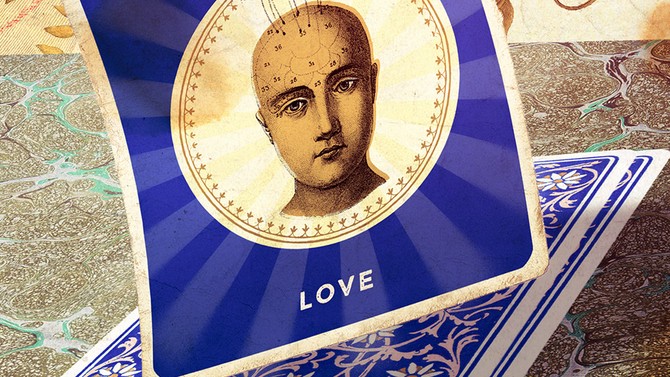
Illustration: Eduardo Recife
Alex Banner on the ways his father keeps in touch.
Before my dad died of cancer, he wanted two things: for me to get into jazz, and to own a Tingler, one of those spidery, metal-pronged head scratchers. After he got sick, the Tingler fell down the priority list, but jazz—that was important. One day just before he went into the hospital for the last time, he and I drove around listening to music. He played me a track by Les McCann and Eddie Harris, a performance of "Cold Duck Time" with a good groove.
When my dad was near the end, his best friend, my brother and I sat with him while he played us the Duke Ellington and Mahalia Jackson record Black, Brown and Beige. It was a profound thing—us men, together, listening to this woman's voice. We knew we were saying goodbye. The last song we heard was "Come Sunday," and I thought, "This is the most beautiful song there ever was."
He died on a Wednesday, ten years ago in October. Not long after, my mom called, laughing through tears. She had found a Tingler in the discount bin at Bed Bath & Beyond. She took it to the counter. The clerk told her Bed Bath & Beyond didn't carry Tinglers. She could just have it, he said. My mom didn't call it a sign, but it was something, she said, something from beyond—or the beyond part of Bed Bath & Beyond, at least. She felt like he had visited her. And then, soon after, he visited me. I was a mason at the time, spending my days digging holes. One day, I was four feet into the ground, listening to "Cold Duck Time" on my headphones, when I hit something: a little white dove carved out of stone. I wept into the hole I'd dug.
Two months later I got laid off. For weeks I walked around San Francisco, asking for work at every job site I saw. I must have left a hundred résumés. One day I was so beat up, so broke and broken, I put on "Come Sunday," which I hadn't heard since that day with my dad. As it played, a guy called to offer me an apprenticeship as a woodworker. I had no experience, but I said yes.
I'd never believed in an afterlife, in heaven and hell. I'm not sure just what I believe now. But I do know that when people die, they don't just die.
I still think "Come Sunday" is the most beautiful song ever recorded, though I don't listen to it much. I prefer to save it. I keep the dove on a high shelf, watching over my house. I own my own woodworking business. And I use Mom's Tingler a lot. It feels so good—like a gentle hand, reaching out to touch you.
Before my dad died of cancer, he wanted two things: for me to get into jazz, and to own a Tingler, one of those spidery, metal-pronged head scratchers. After he got sick, the Tingler fell down the priority list, but jazz—that was important. One day just before he went into the hospital for the last time, he and I drove around listening to music. He played me a track by Les McCann and Eddie Harris, a performance of "Cold Duck Time" with a good groove.
When my dad was near the end, his best friend, my brother and I sat with him while he played us the Duke Ellington and Mahalia Jackson record Black, Brown and Beige. It was a profound thing—us men, together, listening to this woman's voice. We knew we were saying goodbye. The last song we heard was "Come Sunday," and I thought, "This is the most beautiful song there ever was."
He died on a Wednesday, ten years ago in October. Not long after, my mom called, laughing through tears. She had found a Tingler in the discount bin at Bed Bath & Beyond. She took it to the counter. The clerk told her Bed Bath & Beyond didn't carry Tinglers. She could just have it, he said. My mom didn't call it a sign, but it was something, she said, something from beyond—or the beyond part of Bed Bath & Beyond, at least. She felt like he had visited her. And then, soon after, he visited me. I was a mason at the time, spending my days digging holes. One day, I was four feet into the ground, listening to "Cold Duck Time" on my headphones, when I hit something: a little white dove carved out of stone. I wept into the hole I'd dug.
Two months later I got laid off. For weeks I walked around San Francisco, asking for work at every job site I saw. I must have left a hundred résumés. One day I was so beat up, so broke and broken, I put on "Come Sunday," which I hadn't heard since that day with my dad. As it played, a guy called to offer me an apprenticeship as a woodworker. I had no experience, but I said yes.
I'd never believed in an afterlife, in heaven and hell. I'm not sure just what I believe now. But I do know that when people die, they don't just die.
I still think "Come Sunday" is the most beautiful song ever recorded, though I don't listen to it much. I prefer to save it. I keep the dove on a high shelf, watching over my house. I own my own woodworking business. And I use Mom's Tingler a lot. It feels so good—like a gentle hand, reaching out to touch you.
From the December 2014 issue of O, The Oprah Magazine

